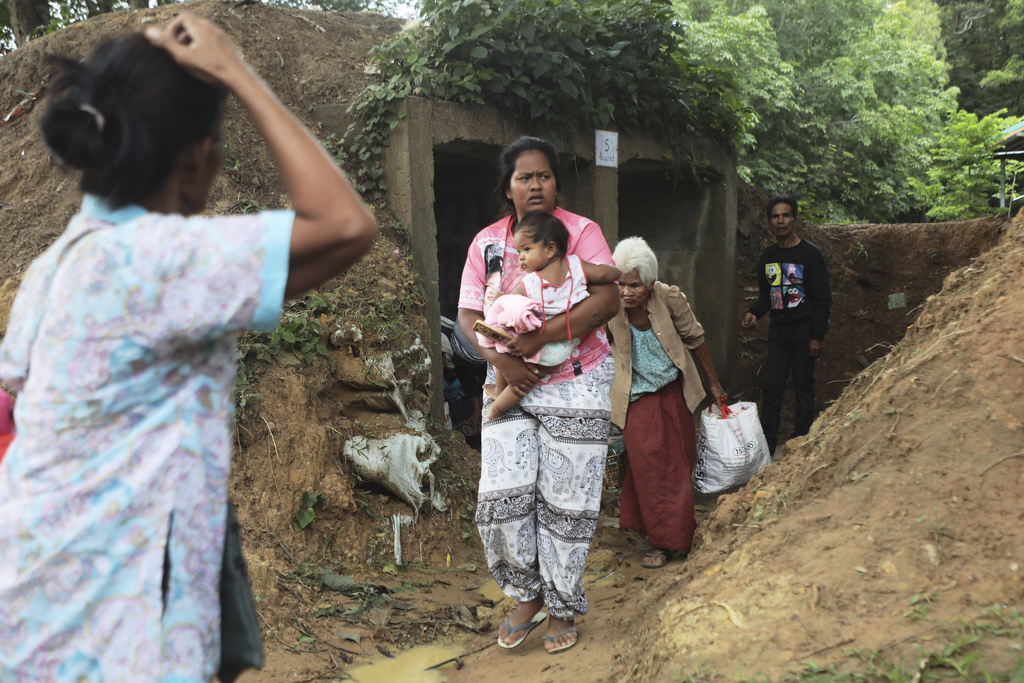Thailand Launches Airstrikes on Cambodia Amid Deadly Border Clashes

Escalation of Border Clashes Between Thailand and Cambodia
Thai and Cambodian soldiers have engaged in a significant military confrontation along their shared border, resulting in at least 14 deaths, mostly civilians. The conflict involved the use of small arms, artillery, rockets, and even airstrikes from Thailand. According to Thai Defense Ministry spokesperson Surasant Kongsiri, the fighting occurred in at least six locations on Thursday. This escalation followed a landmine explosion that injured five Thai soldiers, prompting Bangkok to recall its ambassador from Cambodia and expel the Cambodian envoy.
The clashes resumed early on Friday near the ancient Ta Muen Thom temple, with reports of artillery sounds heard by Associated Press reporters near the border. Cambodia’s chief official in Oddar Meanchey province, Gen. Khov Ly, stated that at least four civilians were wounded in the fighting and over 4,000 people had been displaced from their villages to evacuation centers. This marked the first casualty report from the Cambodian side.
This incident represents a rare instance of direct military conflict between member states of the Association of Southeast Asian Nations (ASEAN). Although Thailand and Cambodia have had historical disputes over the border, they have typically experienced sporadic skirmishes rather than large-scale violence. The last major combat over this issue occurred in 2011, which resulted in 20 deaths.
International Response and Blame Game
U.N. Secretary-General Antonio Guterres urged both sides to exercise maximum restraint and resolve their differences through dialogue. However, both nations have blamed each other for the recent clashes, with accusations of targeting civilians. In Bangkok, the Public Health Ministry reported that one soldier and 13 civilians, including children, were killed, while 14 soldiers and 32 others were injured. Public Health Minister Somsak Thepsuthin condemned the attacks on civilians and a hospital as violations of international humanitarian law and the Geneva Conventions.
Thailand’s Acting Prime Minister Phumtham Wechayachai stated that the fighting affected four provinces, and the Interior Ministry ordered evacuations within 50 kilometers of the border. Meanwhile, in Cambodia, several hundred villagers moved to areas about 30 kilometers inside Oddar Meanchey province, using home-made tractors to transport their belongings. A 45-year-old mother of four, Tep Savouen, described the chaos when she first heard the loud noises, unsure if it was thunder or gunfire.
Military Actions and Diplomatic Tensions
Thai Foreign Ministry spokesperson Nikorndej Balankura warned that the government is prepared to intensify self-defense measures if Cambodia continues its armed aggression. On the other hand, Cambodia’s Defense Ministry spokesperson Lt. Gen. Maly Socheata claimed that their actions were necessary to defend territory against Thai threats, emphasizing that attacks were focused on military targets.
Cambodian Prime Minister Hun Manet wrote to the U.N. Security Council requesting an urgent meeting to address what he called Thailand’s aggression. The council scheduled an emergency closed session in New York on Friday. In response, Thailand sealed all land border crossings and urged citizens to leave Cambodia, with seven Thai airlines offering assistance for repatriation.
Historical Context and Domestic Politics
The border dispute between Thailand and Cambodia has long been a source of tension, with periodic flare-ups along the 800-kilometer frontier. The most recent major conflict in 2011 left 20 dead. Relations worsened after a May confrontation that resulted in a Cambodian soldier's death, leading to Thursday’s intense clashes.
Both sides accused each other of deploying drones before opening fire, escalating the conflict with heavier weapons such as artillery. Thailand responded with airstrikes against truck-mounted rockets launched by Cambodia. The Thai air force deployed F-16 fighter jets in two attacks on Cambodia, calling it an act of self-defense.
Cambodia’s Defense Ministry claimed that Thai jets bombed a road near the Preah Vihear temple, a site of past conflicts. The country’s Culture Ministry vowed to seek justice under international law, as the temple is a UNESCO World Heritage site.
Diplomatic Fallout
Relations between the two countries deteriorated significantly before the clashes began. Thailand recalled its ambassador to Cambodia and expelled the Cambodian envoy following the mine blast that injured its soldiers. Thai authorities alleged that the mines were newly laid along paths previously agreed to be safe, claiming they were Russian-made and not used by Thailand. Cambodia rejected these claims, citing unexploded mines from past conflicts as a possible explanation.
The border dispute also impacted Thailand’s domestic politics. Prime Minister Paetongtarn Shinawatra faced criticism for a phone call with Cambodia’s former Prime Minister Hun Sen, who remains influential. She was suspended from office pending an investigation into possible ethics violations related to the call.
Post a Comment for "Thailand Launches Airstrikes on Cambodia Amid Deadly Border Clashes"
Post a Comment